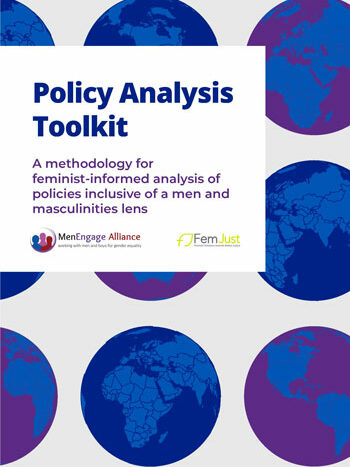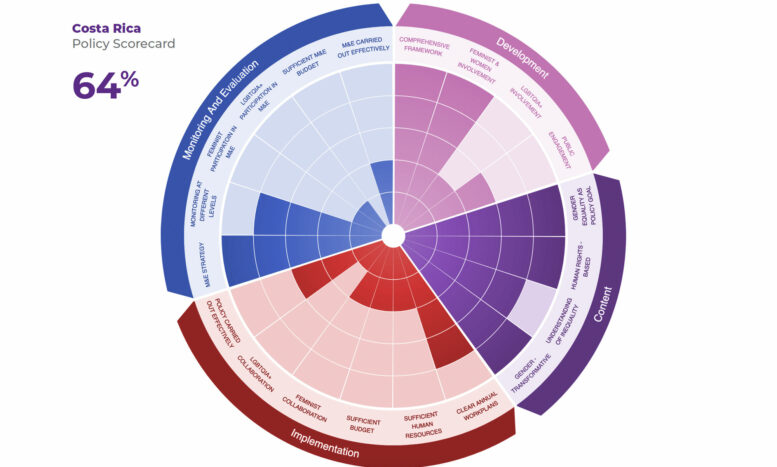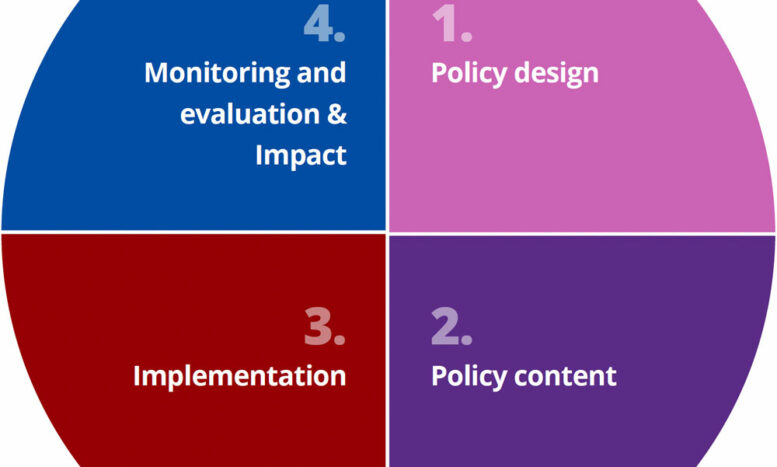Policy Scorecards & Policy Analysis Toolkit
A toolkit to help analyze any gender equality policy that includes a focus on men and boys. It explains a practical and rigorous process to evaluate the policy that you are interested in.
A number of national-level policies have already been evaluated using this toolkit. Explore these below to check if a policy you are interested in has already been evaluated.
By using the Policy Analysis Toolkit, you will be able to evaluate to what extent a policy aims to tackle the root causes of gender inequalities. In addition, you will be able to create a score for the policy you are interested in across a number of criteria.
This toolkit can be used to analyze policies that specifically focus on men and boys. It can also be used to analyze policies that include ‘men and boys’ within a broader focus on gender equality.

Explore the national-level policy scorecards
The methodology in the Policy Analysis Toolkit has been used to review national policies from eight countries to create national policy ‘scorecards’. Each scorecard includes a descriptive case study. The scorecards examine the extent to which policies that focus on engaging men and boys are gender-transformative. This includes evaluating how well they incorporate intersectional feminist approaches and human rights.
- Canada (case study only)
- Costa Rica
- Czech Republic
- Indonesia
- Mexico
- Rwanda
- Sri Lanka
- Trinidad and Tobago
- Turkey

Why evaluate national level policies that include a focus on men and boys?
Strategies that engage men and boys for gender equality are increasingly included in policy measures. This includes policies for preventing gender-based violence, securing sexual and reproductive rights, and promoting equity in work and domestic spaces.
As the Policy Analysis Toolkit explains, when policies are designed well, they can create opportunities to challenge harmful norms, stereotypes, and behaviors. Well-designed policies aim to put people most affected by the issues at the center of the process.
However, the quality of policies varies a lot—including how well they are implemented in practice. This means that many policies that include strategies to engage men and boys do not help to address the root causes of gender injustices.
It is therefore useful to evaluate policies with a critical feminist and human rights ‘lens’. This toolkit aims to give anyone the tools to do this.

Undertaking a critical evaluation using the Policy Toolkit can help you to:
- Gain an in-depth understanding of the quality of a policy in your context, and to what extent it is likely to support gender justice, women’s rights, and LGBTQI rights
- Hold governments to account on the quality and implementation of a policy
- Provide evidence to support calls for policy change
- Monitor and address increasing populism and backlash against women’s rights and rights of LGBTQI people within policies
Who will find this resource useful?
This Policy Analysis Toolkit and the policy scorecards can help advocates who are calling for better policies for gender justice. It aims to support the efforts of MenEngage Alliance members and other advocates to promote gender-transformative policies and programs that are inclusive of a ‘men and masculinities’ lens, where relevant.
It can help you to develop rigorous, evidence-based research to support your advocacy efforts at national, regional and global levels, highlighting key areas of opportunity and challenge in policy advocacy efforts around the world.
These insights are valuable for anyone wishing to act in solidarity and allyship with feminist advocacy efforts, and for calling for policies that include men and boys to be based on feminist-informed approaches.
The Scorecards provide valuable insights for advocates and policy-makers looking to identify promising policy practices that aim to address the root causes of gender inequalities. Likewise, they shed light on poor-quality policies that risk perpetuating inequalities because of policy design, content, implementation, monitoring and evaluation, or a combination of these factors.
For advocates with expertise and interest in men and masculinities, the toolkit aims to support them in carrying out advocacy in responsible ways, and being accountable to feminist and LGBTQI movements.
Find out more
Click here for more information on the advocacy work of MenEngage Alliance.
Click here to see other advocacy resources.
About the authors
This policy review series and Policy Analysis Toolkit were developed by MenEngage Alliance in partnership with FemJust. The project has been developed to further contribute to the advocacy work of MenEngage Alliance and its members through evidence-based messaging.
As a result of this process, eight policy scorecards and an additional case study (Canada) were developed. This effort has also led to the development of the Policy Analysis Toolkit to support others to analyze other policies in the same way.
This project is a result of a commitment by MenEngage Alliance to advocate in accountable ways. This includes connecting with and responding to the concerns of feminist advocates on an ongoing basis, and supporting ‘men and masculinities’ work to contribute to intersectional feminist agendas based on a gendered power analysis of injustices.
